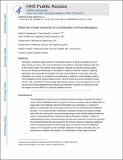| dc.contributor.author | Moynihan, Kelly Dare | |
| dc.contributor.author | Irvine, Darrell J | |
| dc.date.accessioned | 2018-09-07T20:35:52Z | |
| dc.date.available | 2018-09-07T20:35:52Z | |
| dc.date.issued | 2017-10 | |
| dc.identifier.issn | 0008-5472 | |
| dc.identifier.issn | 1538-7445 | |
| dc.identifier.uri | http://hdl.handle.net/1721.1/117685 | |
| dc.description.abstract | Immunity to infectious agents involves a coordinated response of innate and adaptive immune cells working in concert, with many feed-forward and regulatory interactions between both arms of the immune system. In contrast, many therapeutic strategies to augment immunity against tumors have focused predominantly on stimulation of adaptive immunity. However, a growing appreciation of the potential contributions of innate immune effectors to antitumor immunity, especially in the context of combination immunotherapy, is leading to novel strategies to elicit a more integrated immune response against cancer. Here we review antitumor activities of innate immune cells, mechanisms of their synergy with adaptive immune responses against tumors, and discuss recent studies highlighting the potential of combination therapies recruiting both innate and adaptive immune effectors to eradicate established tumors. | en_US |
| dc.description.sponsorship | National Institutes of Health (U.S.) (CA174795) | en_US |
| dc.description.sponsorship | National Cancer Institute (U.S.) (David H. Koch Institute for Integrative Cancer Research at MIT. Grant P30-CA14051) | en_US |
| dc.description.sponsorship | Bridge Project | en_US |
| dc.description.sponsorship | V Foundation for Cancer Research | en_US |
| dc.description.sponsorship | Ragon Institute of MGH, MIT and Harvard | en_US |
| dc.description.sponsorship | Hertz Foundation | en_US |
| dc.description.sponsorship | National Science Foundation (U.S.) (Graduate Research Fellowship) | en_US |
| dc.description.sponsorship | Thomas and Stacey Siebel Foundation (Scholarship) | en_US |
| dc.publisher | American Association for Cancer Research (AACR) | en_US |
| dc.relation.isversionof | http://dx.doi.org/10.1158/0008-5472.CAN-17-1340 | en_US |
| dc.rights | Creative Commons Attribution-Noncommercial-Share Alike | en_US |
| dc.rights.uri | http://creativecommons.org/licenses/by-nc-sa/4.0/ | en_US |
| dc.source | PMC | en_US |
| dc.title | Roles for Innate Immunity in Combination Immunotherapies | en_US |
| dc.type | Article | en_US |
| dc.identifier.citation | Moynihan, Kelly D., and Darrell J. Irvine. “Roles for Innate Immunity in Combination Immunotherapies.” Cancer Research, vol. 77, no. 19, Oct. 2017, pp. 5215–21. | en_US |
| dc.contributor.department | Massachusetts Institute of Technology. Center for Materials Science and Engineering | en_US |
| dc.contributor.department | Massachusetts Institute of Technology. Department of Biological Engineering | en_US |
| dc.contributor.department | Massachusetts Institute of Technology. Department of Materials Science and Engineering | en_US |
| dc.contributor.department | Ragon Institute of MGH, MIT and Harvard | en_US |
| dc.contributor.department | Koch Institute for Integrative Cancer Research at MIT | en_US |
| dc.contributor.mitauthor | Moynihan, Kelly Dare | |
| dc.contributor.mitauthor | Irvine, Darrell J | |
| dc.relation.journal | Cancer Research | en_US |
| dc.eprint.version | Author's final manuscript | en_US |
| dc.type.uri | http://purl.org/eprint/type/JournalArticle | en_US |
| eprint.status | http://purl.org/eprint/status/PeerReviewed | en_US |
| dc.date.updated | 2018-09-06T18:11:24Z | |
| dspace.orderedauthors | Moynihan, Kelly D.; Irvine, Darrell J. | en_US |
| dspace.embargo.terms | N | en_US |
| mit.license | OPEN_ACCESS_POLICY | en_US |
